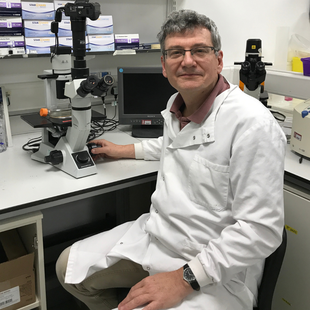Professor Graham Cook

Professor of Molecular and Cellular Immunology
Meet Professor Cook...
What inspired you to get involved with research?
I got the bug when I was an undergraduate at Imperial College. I was lucky to have inspirational teachers who were themselves heavily involved in research. I was fascinated by molecular and cellular biology and my teachers encouraged me to pursue research, the first step of which was a PhD. I have been involved in research ever since and I often remind myself how lucky I am to have a job that I love doing.
What projects are you working on that are funded by Ovarian Cancer Action?
My research group is interested in how the immune system recognises cancer and in particular, how we might manipulate the immune system to attack cancer, a strategy known as immunotherapy. With generous funding from Ovarian Cancer Action, my group is working with colleagues in Leeds and in London to investigate use of viruses that kill cancer cells and activate the immune system. Our project involves learning more about the immune system in ovarian cancer and using this knowledge to test these viruses for their ability to activate immunity and treat the cancer more efficiently.
What is your favourite bit of lab equipment?
We are very fortunate that we have a very well-equipped lab and access to cutting edge technology that helps us to do our research. However, if I am honest then my favourite thing is probably one of the cheapest pieces of equipment you can imagine. It is a small cutting tool that I used in my early career to cut gels carrying pieces of DNA. What makes it special is that I went down to the workshop in the basement of the building and one of the technicians made it on a lathe in front of me in about two minutes. Technology has moved on and it is not needed anymore, but it still sits in a little pot in my drawer in the lab and it will leave with me when I retire!
What is the most rewarding part of your job?
Progress in the lab can be slow and not every result makes sense straight away. You ask more questions and try more experiments and after a lot of head scratching things fall into place. I never get tired of learning how elegant biology really is and to be able to apply new knowledge in the design of new cancer treatments is doubly rewarding. There is another side to this progress which is also very rewarding. The research we do forms a major part of the training of the researchers of the future; seeing our PhD students publish their work, talk at conferences and ultimately getting their PhDs is a tremendous (and essential) by-product of research.
What is the most challenging part of your job?
Like everyone, I found the COVID pandemic to be a major challenge, both personally and professionally. We spent a lot of time making the lab COVID safe for our staff and students and, after an inevitable delay, I am pleased to say that the labs are working well. The everyday challenges that are always with us are ensuring that the lab remains well funded, enabling us to work on challenging but important problems. Research is the biggest part of my job, but I also teach students and I have a managerial role in my institute; balancing these various things can be difficult. Turning off at the end of the day can be hard but it pays off in the long run.
All year round our scientists at the Ovarian Cancer Research Centre, The University of Oxford and beyond are working to find the next breakthrough in ovarian cancer research. Your donation will support the work they do each and every day.